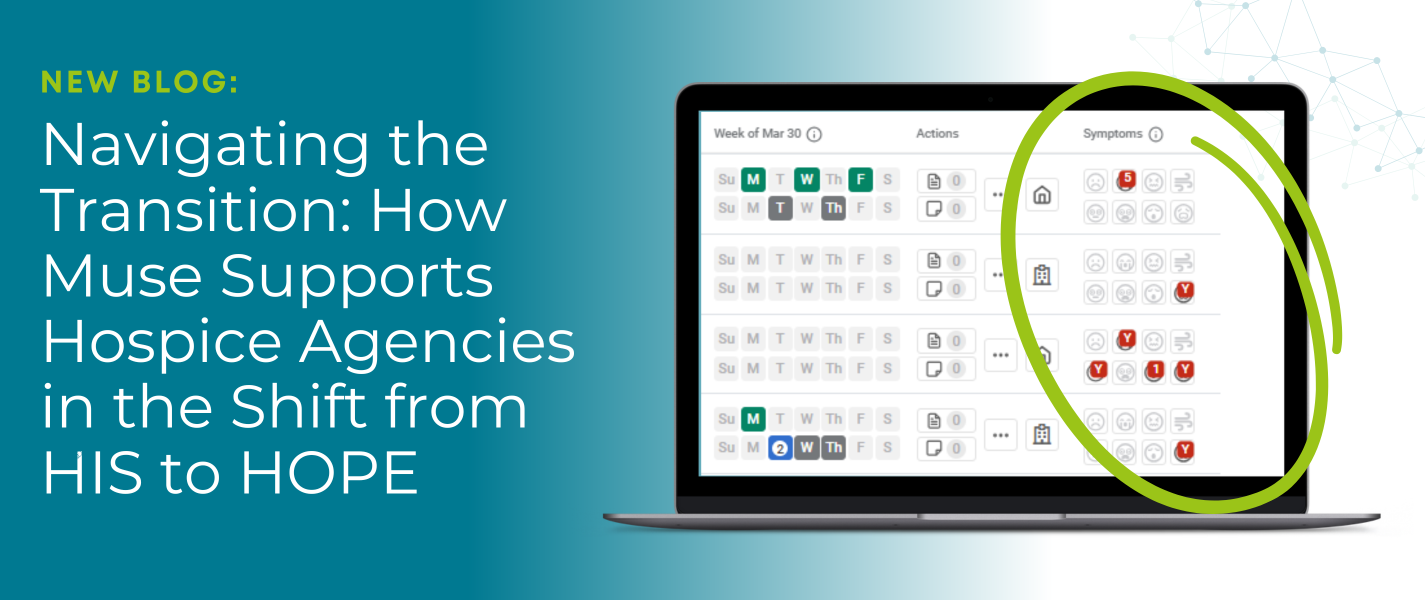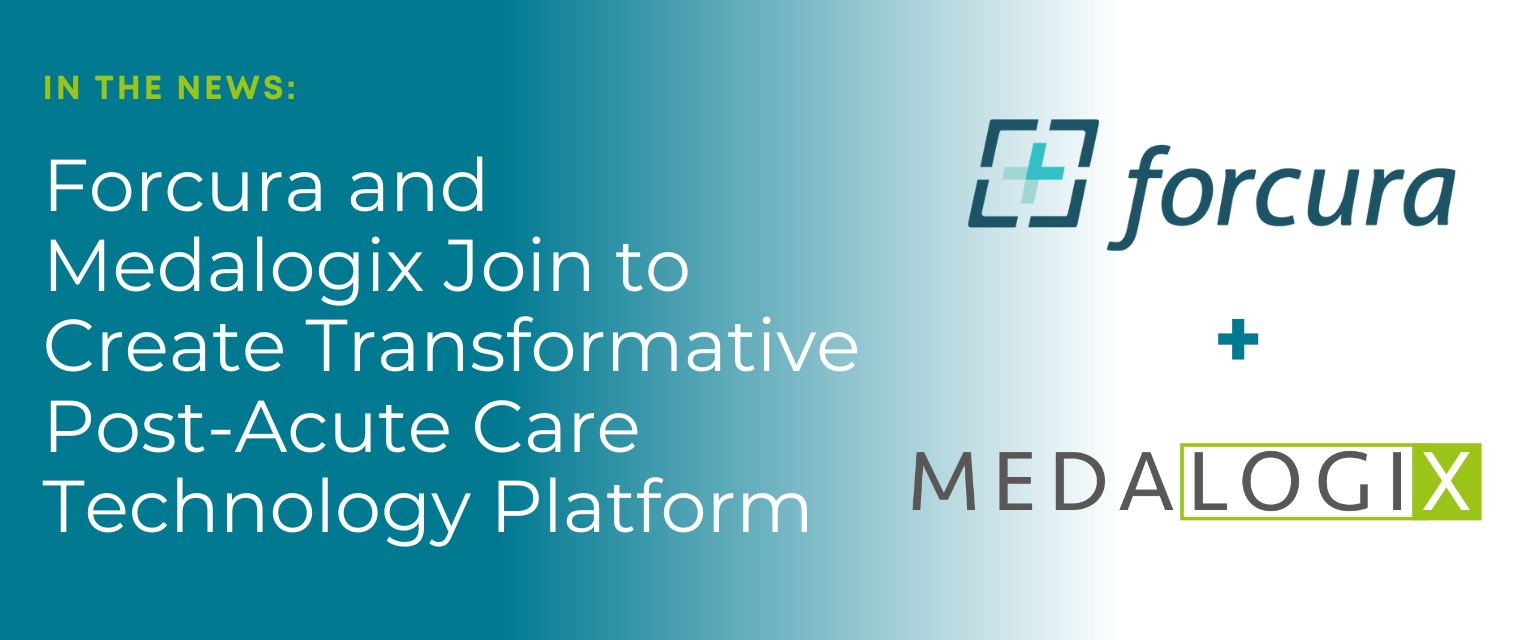Pulse Referrals & Admissions: Real-world AI impact in a sea of hype
Throughout the tech space, including home health, much has been said recently about lowering expectations for generative AI. This conversation, while well intentioned, can sometimes overlook the impressive impact of carefully targeted applications of this technology. With Pulse Referrals & Admissions, Medalogix has integrated generative AI into its product suite with a carefully trained, real-world application of the technology that can make an impact today: providing home health teams with actionable recommendations based on analysis of underlying patient documentation. Medalogix is uniquely qualified to deliver this, building on a long history of successfully applying breakthrough data science specific to the home health space.
Questions have arisen on AI’s general and home health-specific capabilities
Countless publications have joined in the recent conversation on AI’s capabilities and how we should collectively shape our expectations for the future. The question has been approached from multiple angles, and skepticism around AI extends into the home health space. This is rooted in the fact that without thoughtful engineering, generative AI can be ineffective at coding. In their article “AI Will Not Replace Medical Coders,” the American Academy of Professional Coders (AAPC) explains that “the prospect of automating medical coding is especially daunting because of the complexity of health information management.” We agree that coders should not be replaced. With careful engineering, however, generative AI can be a valuable tool to cut through complexity and help professionals arrive at more accurate, complete, and efficient coding.
The complexity involved here stems from the wide variety of data within the EMR – written notes, test results, etc. This can be problematic because AI systems generally “lack the contextual awareness required to decipher and extract pertinent information form such diverse and occasionally illegible records.” Another challenge is changing regulations for codes, policies, and documentation requirements, which AAPC describes as “a logistical nightmare for AI.” While the core argument that medical coders remain essential is one we support, we know that the right solutions can partner with coders and other home health professionals to drive more accurate documentation and coding than humans or AI alone can achieve.
How can generative AI realistically address challenges in home health?
It’s important to note that when investments are made in an application of AI that exceeds its current capabilities, disappointment is inevitable. However, accurate appraisal of the challenges to which AI’s capabilities can be applied can lead to significant benefits. For example, let’s look specifically at referral processing and admissions. Industry referral rates are up more than 100% over pre-COVID levels, while acceptance rates hit an all-time low in Q4 of 2022 and aren’t much higher now. Agencies often find it difficult to keep up with referrals. The average referral packet is 35 pages, with some reaching nearly 300 pages. Assuming 2 minutes to analyze each page, the average referral can take over an hour to review thoroughly.
After accepting a referral, the challenges don’t go away. Providers have only 48 hours to complete initial patient visits, which combined with the difficulty of manual review causes 30% of all admitting visits to be late. Notices of Admission must then be completed within 5 days of the admitting visit, but on average this takes 14 days. It’s clear that the volume and complexity of referral documentation can be overwhelming for humans.
With the right guardrails and inputs, generative AI can be a powerful tool in this space, but this requires specialized knowledge to build and implement. Simply feeding patient data into GPT isn’t going to provide reliable, useful responses, which impedes agencies from using it themselves to any real effect. Much like scientists generally must train any data science model, GPT requires careful engineering, optimization, and oversight to accurately read, summarize, and provide insights from clinical records to augment and accelerate human processing capabilities.
By applying our exhaustive data science and predictive analytics experience, Medalogix has built proprietary prompt engineering that turns generative AI into something far more reliable and targeted. In fact, we’ve taught GPT within our referrals and admissions solution to be accurate enough that we’ve found coding deficiencies in approximately 47% of concluded episodes that we’ve evaluated. About 37% of cases had missed something in clinical documentation, while about 10% were at risk for compliance issues. Issues with these records are flagged for further review and appropriate documentation correction based on the provider’s determination. Correction of these deficiencies has implications for both care planning and billing and reimbursements, impacting patients and agencies alike.
Pulse Referrals & Admissions is an effective application of generative AI, with real-world impact.
In an interview with NPR, Massachusetts Institute of Technology Professor Daron Acemoglu argues that “a lot of people in the industry don’t recognize how versatile, talented, multifaceted human skills and capabilities are.” We happen to agree! Part of successfully applying generative AI is recognizing that there is value to what humans and machines each bring to the table. Pulse Referrals and Admissions applies generative AI with an appreciation for where humans’ time is best spent. The goal is for AI to help humans spend more time leveraging their irreplaceable skills.
In an environment full of concern around whether AI can make a meaningful impact to coding, Referrals & Admissions knows exactly what it is and delivers on its mission. The core role played by technology here is supporting providers in considering the full patient picture, especially pieces they may have missed in existing documentation, using recommendations based on clinical evidence in the patient record. This lets home health teams process referrals more quickly and accurately, and better prepare for admitting visits and subsequent documentation submissions.
Medalogix had already built a proven track record in the data science space before generative AI became a hot topic in tech. We know better than to think real-world value can be derived from just building a shiny box around GPT. Rather, we apply our extensive data science experience to harness generative AI capabilities with targeted, proprietary prompts that deliver actionable insights for home health teams. This takes a couple forms:
- Referral Summaries: At the referral processing stage, Pulse Referrals & Admissions condenses lengthy referral records into a single page, source-linked clinical summary. This summary is then reviewed by the talented humans who are already working in intake and admissions, who remain an important part of the puzzle. This is a targeted area where machines can help humans, because manual review of referral documents is inefficient and not always fully accurate. By applying generative AI to these packets, Medalogix helps providers improve their review of referral documents to solve longstanding industry challenges with timely referral processing and admitting visits.
- Admission Summaries: After a patient is admitted, Pulse Referrals & Admissions applies machine learning to cross-reference clinical documentation. Based on this analysis, and citing supporting clinical evidence, the product helps care teams improve documentation accuracy with AI recommendations for OASIS. Referrals & Admissions addresses potentially missing or inaccurate diagnoses, comorbidities, and functional impairments by recommending clinically supported changes and linking to the relevant section of clinical documentation. After review, users can easily carry these updates and supporting evidence over to the EMR to update OASIS. This helps solve issues with timely NoA submissions and other documentation-related challenges.
The recommendations provided are easy to review, with supporting and conflicting insights appearing differently. When clinical evidence is reviewed, the product highlights the relevant sections of patient documentation to circumvent manual digging. On top of the corrections facilitated by the product, supporting evidence for existing diagnoses, etc. helps solidify decisions already made and defend these choices in the event of an audit.
PDGM is a complicated model with hundreds of possible permutations, many of which require different levels of care and impact coding and billing on some level. With assistance from Pulse Referrals & Admissions to get OASIS right, home health teams are better able accurately code and be reimbursed correctly. The top reasons for inappropriate payments to agencies are insufficient documentation (68%) and incorrect coding (22%). Referrals & Admissions addresses both issues by aligning referral documents, clinical notes, and OASIS for accurate coding and reimbursements.
As Emily Paloian, Product Lead for Pulse Referrals & Admissions shared, “We know that quality and coding professionals work hard to consistently submit everything with complete accuracy, but the complexity of PDGM, plus digging through sometimes hundreds of pages of documentation, makes their jobs extremely difficult. It’s been exciting and rewarding to develop AI recommendations and insights for OASIS that point these teams towards the most relevant information and help them perform at their best.”
In short, Pulse Referrals & Admissions is a targeted, well-trained application of AI that directly helps alleviate industry challenges and drives more effective, accurate work from home health teams. We do this by helping humans to review and act on insights, creating a true partnership that lets both technology and people do what they’re best at.
Some final thoughts
While concern around what generative AI can accomplish is understandable, impactful applications of the latest technology do exist. Medalogix leverages specialized data science experience to apply it in the right way, addressing longstanding industry challenges and providing clinicians with a leg up as they balance heavy demands on their time. Especially in an industry as people centric as healthcare, AI can play a helpful role in letting humans spend their time where it’s most impactful to patients, while supporting more accurate documentation decisions and coding, which in turn can position nurses and other clinicians to make more fully informed care planning and provision decisions. To learn more about Pulse Referrals & Admissions, visit our product page and schedule a demo!
Related Blogs

Navigating Homecare’s Persistent Challenges with Technology-Driven Solutions
Authored by: Amanda Fabozzi, PT, DPT, Director of Clinical Services ...

Navigating the Transition: How Medalogix Muse Supports Hospice Agencies in the Shift from HIS to HOPE
Authored by: Steven Shelton, MBA, MSN, RN, CHPN; Senior Director, Clinic...

Forcura and Medalogix Join to Create Transformative Post-Acute Care Technology Platform
Berkshire Partners Will Serve as Lead Investor in the New Platform, with...


